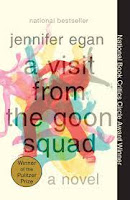When you’ve had the best chocolate ice cream you think you've ever had, it puts a new spin on any chocolate ice cream you have later. It can be good, tasty, even highly satisfactory. But there can also be a nagging thought: I’ve had better. Unfortunately for Jennifer Egan’s A Visit from the Goon Squad (2010), I’ve been spoiled.
In structure, A Visit from the Goon Squad is like a food web that’s been chopped up and put out of evolutionary sequence. Rather than the line of dominoes most novels are, Goon Squad moves from this animal to that, bouncing over to this phylum and rank a decade ago, then to this species in the future. Each chapter focuses on a new specific person or situation. There are stories of women, men, rich, poor, black, white, young, old, and everything between—a real spectrum of humanity linked in direct fashion (family or friends) or indirect fashion (same time and space or industry).
As such, it’d be easy to say Goon Squad is about the inter-connectedness of humanity. While there is an argument to be made, it’s just as possible to argue that that “chopped web” is the structure of the novel—the way of building the overarching idea/theme, nothing more to be read into it. I make this comment because, looking into the details of the individual’s lives I believe there is more to be discovered in the book's theme.
Buddhism as a philosophy is known for highlighting the significance of suffering. A subjective term (pain for one person may be neutral for another), A Visit from the Goon Squad highlights the variety of ways in which we suffer, and perhaps more importantly, don’t always do ourselves favors trying to escape said suffering. Before you know it, a person has been dealing with certain controllable or changeable conditions or situations for decades and decades. Nothing fatalistic (there are a few happy endings, or perhaps more precisely, life improvements for some of the people), Egan nevertheless takes a nod from Proust in examining the effect time has on people’s personal situations and characters.
Quality chocolate ice cream, Goon Squad is both an atypical novel in structure and content. It is a satisfactory novel for the multiple representations of humanity, and the indirect manner in which their arcs are interlinked and resolved. That rock music is the glue binding the novel together also does it many favors. But I’ve had better. Olga Tokarczuk’s novel Flights (original Polish title Bieguni) is loosely similar to Goon Squad. But it amps up the psychological and emotional realism. Tokarczuk gets into the head of her characters in a way that Egan almost does, but just not quite. Tokarczuk's ice cream is better.
It just wasn’t 100% there for me in Goon Squad. Egan doesn’t go as deep into the psyche of her characters as Tokarczuk. As such, Egan’s representations come across as realistic but not complete. Is it a character on the page, or a person? For Egan it’s a mix, for Tokarczuk it’s living and breathing. Egan’s story of the kleptomaniac, for example, expresses how such people may feel—the guilt, the desire, the shame, the seemingly uncontrollable behavior. But there is always one thread tying it to caricature. Yeah, that was a klepto. But was there something else, something that rendered her more than a bubbly but relatable Renee Zellweger in Bridget Jones’ Diary? Does the true pain of time come through in her life and into the reader’s imagination? The answer is not wholly believable—or at least not as believably as Tokarczuk.
Which leads to potentially the biggest hole in Goon Squad: tone. While the subject matter seems as though it should have some gravitas (suffering through time, after all), the authorial voice instead renders the novel rather straightforward, even a light affair at times. People’s personal and/or difficult situations are described in black and white words, but not always made known to the reader through what is written between them. The stories touch the head more than the heart, a facet that is heavily influenced by their diction. Egan does experiment, successfully at times, but the overall narrative doesn’t seem to have a strong voice complementing theme.
In the end, A Visit from the Goon Squad is good, tasty chocolate ice cream. Egan literally weaves a number of tales of people dealing with, or not dealing with, the mental cards life has dealt them, all around a nexus of rock and roll. If you are looking for a book off the beaten path in terms of structure and organization, this is absolutely it. The degree to which the emotional realism resonates with you, will differ, however. Read Goon Squad, and once you have, read Tokarczuk’s Flights.


No comments:
Post a Comment